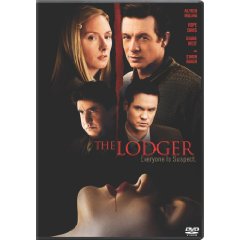 The Lodger is another in a long line of contemporary films that attempt to combine the murky atmosphere of L.A. film noir with the tension and suspense of a Hitchcock thriller. The character archetypes are present, from the hard-nosed cop in the vein of Jimmy Stewart, to the blond femme fatale who may or may not be crazy, a la Kim Novak. The look of The Lodger certainly captures the mood of those old ’40s films, and the actors who populate the movie do an admirable job of trying to make it interesting to watch. Unfortunately, David Ondaatje’s poor pacing and lack of direction drags down whatever good is in the film, turning it into just another crime thriller you can see any Saturday night on Lifetime.
The Lodger is another in a long line of contemporary films that attempt to combine the murky atmosphere of L.A. film noir with the tension and suspense of a Hitchcock thriller. The character archetypes are present, from the hard-nosed cop in the vein of Jimmy Stewart, to the blond femme fatale who may or may not be crazy, a la Kim Novak. The look of The Lodger certainly captures the mood of those old ’40s films, and the actors who populate the movie do an admirable job of trying to make it interesting to watch. Unfortunately, David Ondaatje’s poor pacing and lack of direction drags down whatever good is in the film, turning it into just another crime thriller you can see any Saturday night on Lifetime.
Alfred Molina, one of this generation’s great character actors, stars as Detective Manning; he’s the Jimmy Stewart character who’s carrying the weight of the world on his shoulders. While trying to solve a series of grisly murders that appear to be connected to one of his old cases (murders modeled after Jack the Ripper), he’s also responsible for breaking in a gung ho new detective (is there any other type?) who thinks he knows more than his more experienced partner. Shane West is Street, the good-looking, fastidiously dressed young gun who gets paired with Manning. At the same time, Manning is dealing with the aftermath of his wife’s attempted suicide and confinement to a mental institution. The breakdown of his marriage has also strained his relationship with his daughter, Amanda, played by Rachel Leigh Cook (who is wasted in this movie).
Happening concurrently to the action with the police department is the story of Hope Davis’ Ellen, a depressed housewife married to a lout named Bunting, played by Donal Logue. They are suffering financial woes and are trying to rent out their guesthouse. Enter a writer, Malcolm, played by Simon Baker, who pays them three month’s advance to become their lodger.Á‚ Malcolm is eccentric, neat, and very, very mysterious. He’s so mysterious that we automatically assume he’s the serial killer. Ellen is lured to him, and he apparently seems to be attracted to her as well.Á‚ Á‚ Of the two storylines going on in The Lodger, the one between Ellen and Malcolm is the more involving. The scenes between Baker and Davis contain a sexual and psychological tension that the other portion of the movie is lacking.
The Lodger‘s biggest problem is its dialogue, which seems to have been written for the sole purpose of bludgeoning the viewer with every fact and leaving nothing to the imagination and nothing for the viewer to be surprised about. Furthermore, poor Rebecca Pidgeon is relegated to the role of Dr. Westin, whose only function in the movie is to deliver line lines of exposition that a) explain how the mind of a serial killer works and b) sum up the entire past of the film’s killer in the last three minutes to explain the motive (sort of like the last three minutes of a Dragnet episode).
As the two plots in the film slowly converge, improbabilities and holes in logic conveniently come up to keep the story “exciting.”Á‚ Consider how Manning, suspended from the department, is still able to continue his investigation with West and easily walks on and off of crime scenes. Also, how is it that when Molina sees that the murder suspect is in a certain neighborhood, he immediately assumes someone close to him will become the next victim even though there is no logical reason for him to think this?Á‚ Well, for a film like this, someone close to Molina HAS to be in jeopardy, otherwise there wouldn’t be an exciting conclusion in the third act — and these are just two of the many problems with The Lodger.
The film is not without its merits. The cinematography by David A. Armstrong and his crew is inspired, and does an excellent job of capturing the hustle and bustle, yet claustrophobic atmosphere of Los Angeles. Moreover, the camera work gets inside Ellen’s head and projects her unsteady world coming apart. The cast, which also includes, Philip Baker Hall, put forth a valiant effort to create believable characters.Á‚ But time and again, it feels like they were left to their own devices to work with little feedback from their director. Of course, I could be way off base; perhaps Ondaatje was a real hands-on director. If that’s the case, then he’s still at fault for creating such a ham-fisted film that drags on for what feels like much more than its 96 minutes.

![Reblog this post [with Zemanta]](http://img.zemanta.com/reblog_e.png?x-id=53eea2f9-4a59-44ec-afea-0d27a11349b5)



Comments